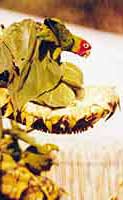| the second ANIMALS Page of F Sheff at Home |
| 1. The Challenge: E.T. the Alarm
Dog and protector of his master's domain directs his remonstrance at an interloper,
to little effect. Click on the dog to see him in a closer view. Use your browser's
Back button to return. |
1 | 2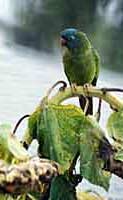 | 3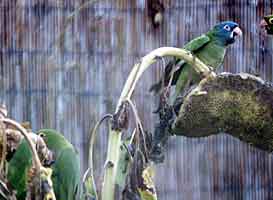 |
|
4 | 5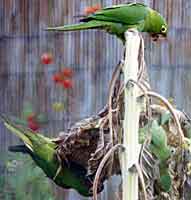 | 6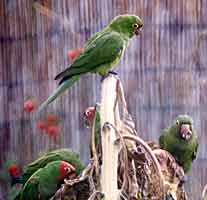 |
| 4. The
Challenge, part 4: One of the new
arrivals was a near relative with a different look; a redhead. Aratinga erythrogenys
or Red-masked Conure, according to the Lexicon
Of Parrots. 5.The Challenge, part 5: It's over. The insurgents have taken over, and E.T. the Alarm Dog has retired from the field. Here you see the redhead demonstrating upside-down extraction to some of the others. It may be that with the exception of the red-headed ones, all are Sharpe-tailed conures. The young have green heads. 6. The new regime settles in: Chowtime. This flock of eight returned to the yard twice a day for nearly two weeks, while the supply of sunflower seed matured and maintained. (In the background you can see another invader: cherry tomatoes coming over the fence from the back-neighbor's yard. They were delicious.) Where did these birds come from, you ask? Aside from ordinary escapes, the numbers are here because of a lucrative trade in illegal birds. Normal import channels require expensive quarantines, one of the reasons legitimately imported birds in shops are so costly. Bird smugglers sedate the young birds they've captured and brought to Tijuana (the International Border is about 30 miles south of our place), either with drugs or cold. When the smugglers approach the border, they evaluate their chances of getting caught. If it seems to them there is a high inspection ratio in effect, or the sleeping contraband begins to awaken, they just dump the birds before they get to the inspection station. When the birds revive completely, those that are not otherwise confined fly away. There are hundreds and hundreds of these escaped birds in San Diego neighborhoods. A large flock in Ocean Beach includes military macaws and other large, rare, expensive species. These birds are attractive but noisy and messy, as are most hookbills. |
| The ANIMALS Pages 1 | 2 | 3 | 4 | 5 | 6 | 7 | 8 | 9 | 10 NEXT |
| the
DAD Page | the
MOM Page |
the MARGARITA Page the GARY Page | the GENEVA Page | the KELSEY Pages the SANDY Page | the GUADALUPE Navarro Page the ANIMALS Pages | at HOME Page | the FRIENDS Pages |
| TOP of Page |
